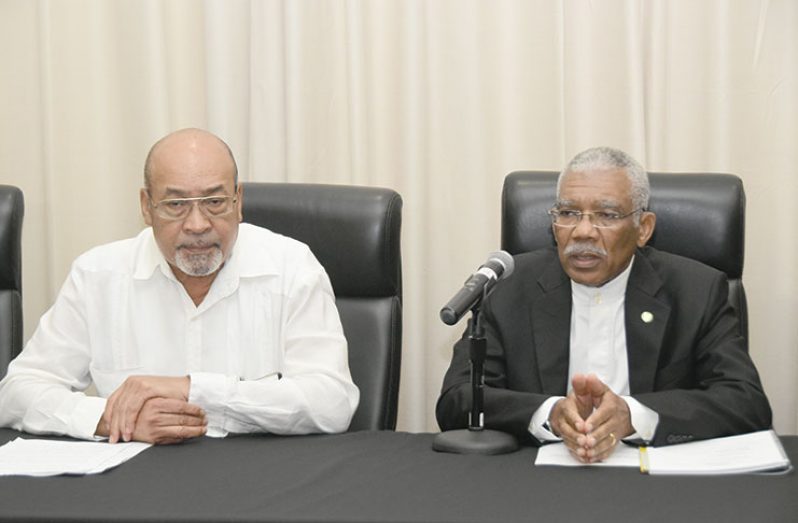-Suriname yet to consult the Netherlands to open archives
THE likelihood of an immediate resolution of the Guyana-Suriname border controversy is seemingly not possible, as no attempt has been made by Suriname to have the Kingdom of the Netherlands open its archives to facilitate research by the two neighbouring countries.
This was one of the issues Surinamese President Dési Bouterse was quizzed on at a press conference on Friday, following a one-day working meeting with Guyana’s President David Granger in Georgetown.
The two presidents told journalists that the state visit by Bouterse was aimed at further strengthening cooperation between the neighbouring Caribbean Community (CARICOM) states, and President Granger said the two leaders had used the opportunity to address the removal of obstacles which have the potential to contribute to conflicts.
Using this statement as a reference point, the Surinamese President was asked if his country had made attempts to have the Kingdom of the Netherlands – its former colonizer – open the relevant archives to facilitate research on the border controversy.
The border issue has to do with ownership of the “New River Triangle”, an area of roughly 6000 square miles that is controlled by Guyana. Suriname has laid claim to this area, and refers to it as “Tigri.” Bouterse deems the border issue “a sensitive one for both of our countries.”
He said both countries understand this, and “our countries have their own instruments to gather the information and data, to see how they will analyze this and present it.” However, he did not say specifically whether Suriname had requested that the Kingdom of the Netherlands open the Dutch Archives to facilitate research. Guyana, on the other hand, has already made a large portion of its documents available to Suriname for its scrutiny. This was revealed by President Granger earlier this year.
“Guyana has already made a large portion of its documents available to Suriname for its scrutiny. It is hoped that the Suriname Government will do likewise, by requesting the Government of the Netherlands to open the relevant Dutch Archives to facilitate research by both sides. The British Archives are open to all. Guyana has nothing to hide,” President Granger had said.
The Surinamese leader has not found much favour with authorities in the Kingdom of the Netherlands. In fact, Netherlands legislators have sought ways to have their Prime Minister, Mark Rutte, arrest Bouterse and extradite him to that country to serve his jail term on cocaine trafficking charges. Convicted in absentia in 1999, Bouterse was given an 11-year jail term.
Bouterse further stated at the press conference that both countries have a responsibility to collaborate and cooperate with each other in the areas which have been identified, in order to bring about the level of sustainable development each country needs.
President Granger has always said that the boundary between Guyana and Suriname was definitively established by 1936. He said earlier this year that there is an agreement as to what constitutes the territory of Guyana and what constitutes the territory of Suriname despite there being no formal treaty that encapsulates that agreement.
Guyana is separated from Suriname by the Corentyne River, which for more than 150 years has been accepted as forming the western boundary of Suriname. Previously known as Dutch Guiana, Suriname was a colony of the Kingdom of the Netherlands. In the 1960s it became an integral part of the Kingdom of the Netherlands, and the Government of the Kingdom was responsible for its external affairs. Suriname became an independent nation in 1975.
President Granger has posited that Suriname having achieved independence after Guyana, “The Netherlands could not have bequeathed to Suriname, at that country’s independence on 25th November, 1975, what it did not possess.” The President has also said routinely that Guyana has no intention of displaying aggression towards its neighbour with which it shares a relationship on three levels: bilateral; at the level of CARICOM; and at the level of the Union of South American Nations (UNASUR).



.jpg)









